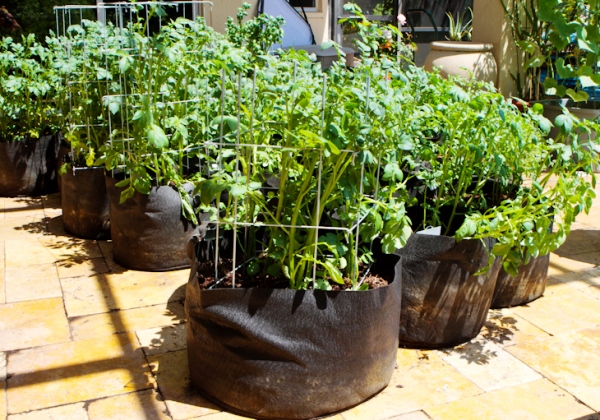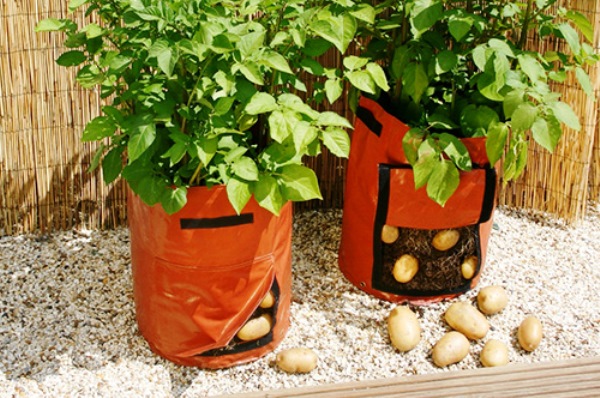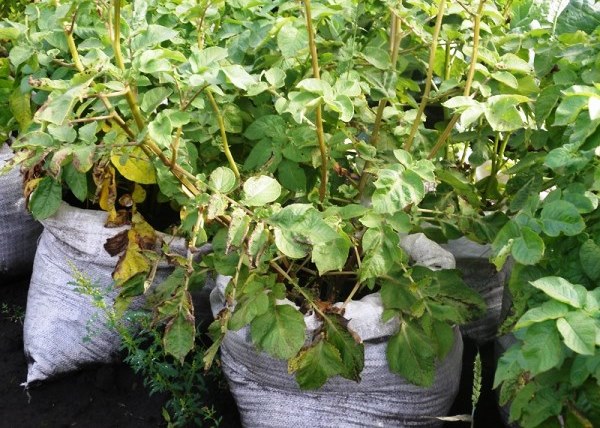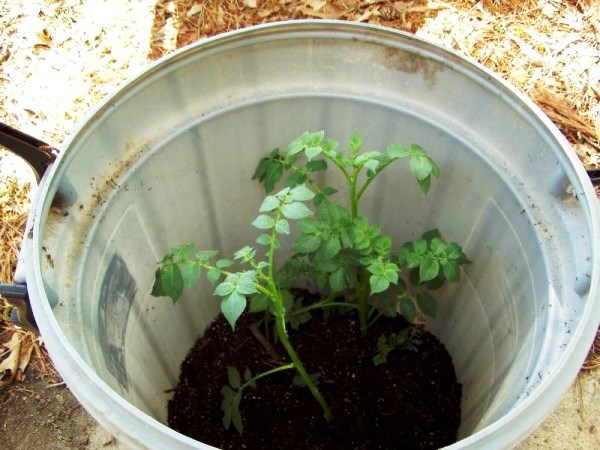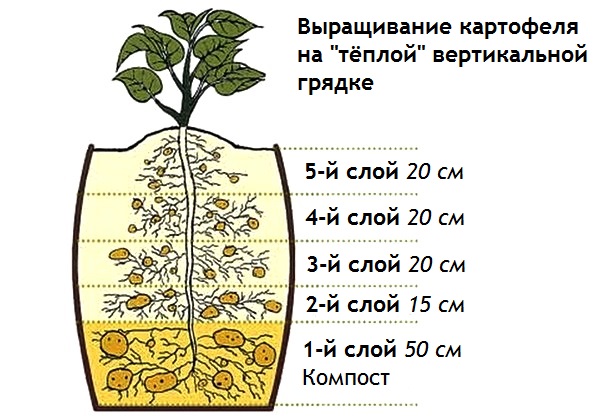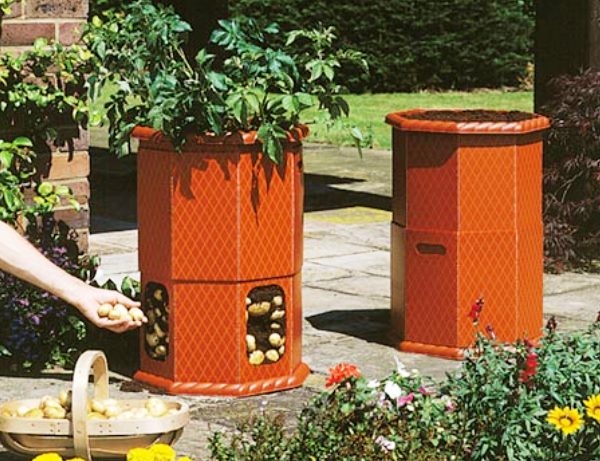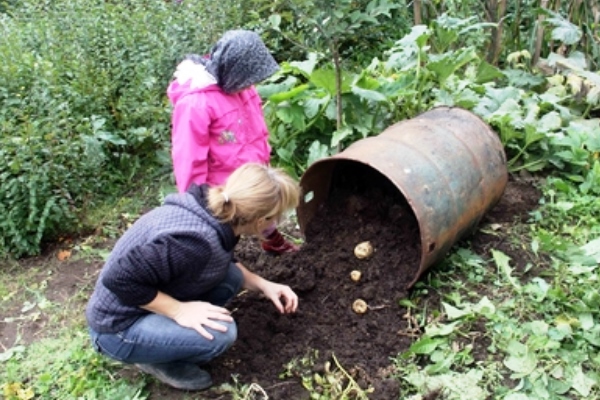We save space - we grow potatoes in bags
All summer residents and gardeners try to grow potatoes on their own plot in order to get a healthy, environmentally friendly and tasty product. In addition to traditional methods of growing root crops, unusual ones are also used in small areas, for example, growing potatoes in bags.
Content
The essence of the method
This method is applicable on small backyards or summer cottages, where the soil is unproductive.
Planting begins in May when the weather is warm. To plant potatoes in bags, they take plastic bags, seeds of early potato varieties, manure and soil. Rotted leaves, dust, manure, sawdust are used as humus. Any land is suitable (black soil, yellow sand, a small amount of clay to retain moisture).
To grow potatoes in bags, you cannot take the land on which the nightshade grew: tobacco, pepper, eggplant, tomatoes, etc. This precaution is necessary so that late blight and other viral diseases and their pathogens do not spread. You cannot take land and manure from those places where the bear lives.
The bags are tucked in half, filled with humus up to 40 cm, laid out potatoes (no more than 5-6 pieces), covered with earth and watered. Another layer of potatoes is laid out and covered with a small (up to 15 cm) layer of humus. Shoots should appear in a week or two. The sprouts fall asleep again and do this until the bag is 2/3 full.
After that, bags of potatoes are placed in a well-lit place that is available for irrigation: near the house, near the fence on the sunny side, along the garden paths.
The moisture from the bags evaporates quickly, so the plantings need to be watered regularly.
There is another way to grow bagged potatoes. This technology is not very different from the first method.
For growing potatoes, take special bags with holes in the bottom, designed for 1 nest of tubers and a yield of up to 4 kg when planting 4-5 tubers. These containers can hold up to 40 liters of fertile mixture. The height of such a bag is 45 cm, diameter is 36 cm, there are handles on the sides so that it is convenient to transfer to another place, and valves that can be opened after watering to allow air to reach the roots.
A mixture of earth, humus and peat is poured into the bag to a height of 10 cm. The tubers are laid out with "eyes" up and watered. After the sprouts grow up to 7 cm, they are covered with the same mixture so that only the tips of the leaves are visible. Then water and repeat the procedure until 10-15 centimeters remain to the upper edge of the container.
You can get a harvest of early potatoes without much hassle in this way. The bag is filled with a nutrient mixture (earth with humus), tied, laid on the ground and cross-shaped cuts are made on it. Sprouted tubers or seedlings are planted in them. First, the bags are placed in a warm place, and then, with the establishment of warm weather, they are taken out for hardening. When there is no threat of frost, they are taken out to a permanent place. With this technology, the soil is periodically moistened. The most positive point in this case is the absence of weeds. And the crop ripens much earlier than with conventional planting.
Instead of bags, you can use barrels, boxes, boxes or other similar containers up to 50-60 cm high. In this case, many holes with a diameter of up to 2 cm are made in the side walls of the container, and the bottom is removed. A layer of earth and humus is poured into a barrel to a height of 10 cm, potato tubers are laid out at a distance of 20 cm from one another, sprinkled with a layer of earth (up to 10 cm), watered.After the sprouts appear, they are sprinkled and this operation is performed until the barrel is filled to the very top.
Potatoes in barrels are grown using almost the same technology as in narrow beds. That is, the barrel should not be very high, and the ground level in it should be 20 cm below its sides. The tubers are placed 5 cm deep and sprinkled with straw (layer height 10 cm). when the sprouts grow up to 50 cm, they are laid out with rays and sprinkled with earth.
Vertical beds in plastic bags will allow you to grow over-yields. On such beds, domestic varieties (Nadezhnaya, Svitanok Kievsky, Slavyanka, Molodezhnaya), the German variety Bellarosa, and the Dutch Shante are usually cultivated.
Advantages and disadvantages of the method
Growing potatoes in bags has its advantages and disadvantages. The advantages include the following:
- planting care is simplified: there is no need to loosen the ground, weed and huddle the plants;
- there are significant savings on arable land: when planting and harvesting, there is no need to dig or plow the land;
- potatoes do not rot: water in bags or other containers does not stagnate;
- no need to fight weeds, late blight and various pests - the Colorado potato beetle, bear and others;
- for plantings of this type, you do not need a lot of space: the bags are located on a minimum area;
- the humus formed after growing potatoes in bags can be used to fertilize other crops (except strawberries and tomatoes).
There are many positive aspects, but there are also negative ones:
- with this technology of planting potatoes, you need a lot of humus;
- it is necessary to constantly monitor soil moisture;
- you will have to carry a lot of earth to fill the bags, and then find a place where to scatter it;
- if you grow potatoes in large quantities, then the cost of purchasing bags will be required.
Therefore, this method is more suitable for small areas where the soil is not suitable for potatoes, or areas affected by a bear.
Reviews of gardeners
Summer residents and gardeners are ambivalent about such methods of growing potatoes. The reviews are radically different: some praise such technologies, share the secrets of how to grow potatoes in bags, and recommend trying all the methods. It is possible that these people know some special secrets or use special drugs - growth stimulants.
Perhaps there are some special tricks. For example, some potato growers use a full length perforated hose that is plugged at one end to deliver water and air to the roots of the plants. In a barrel, it is laid in a spiral and air is pumped into it with a pump or connected to a water supply system.
Other potato growers believe that this is a waste of time, effort and money. Their experience of growing potatoes in bags was unsuccessful: there were few potatoes, and they were very small, but there was a lot of fuss. Some try to explain the reasons for the failure, believing that the plant does not have enough strength to grow fruit, as it grows up all the time and tries to get out of the ground.
There are opinions that potatoes do not bear fruit in the lower layers, but form them only in the upper layer. Some gardeners say that the potatoes planted in this way did not even begin to bloom and wilted already in July.
Someone thinks that the roots of potatoes planted in a barrel will not receive enough oxygen, since the soil in it will be dense, and therefore tubers will not form.
In the reviews, potato growers also talk about the maximum load on the plant: despite all the efforts, one potato tuber will not be able to yield more than a certain limit during the growing season. And even if a lot of tubers are tied up on a long stem, which is constantly added in drops, it is possible that the plant simply does not have enough strength to “feed” all the fruits to normal size.
It is worth paying attention to the opinions of those summer residents who believe that the plant will not have enough strength or time to form a large number of good tubers, since the entire vegetation resource is spent on the growth of the stem.
In general, in order to form your opinion about the appropriateness of a particular technology, you need to try, experiment. There are no special additional costs, and it will take no more time than growing potatoes in the traditional way. Try it, and suddenly you manage to get a great potato crop on your site. Then you will know exactly how best to grow potatoes - the old fashioned way or in bags.
Video "Method of growing potatoes in a bag"
In the video, an experienced gardener tells how he grows potatoes in bags: the procedure, the advantages of the method, and the harvest.

